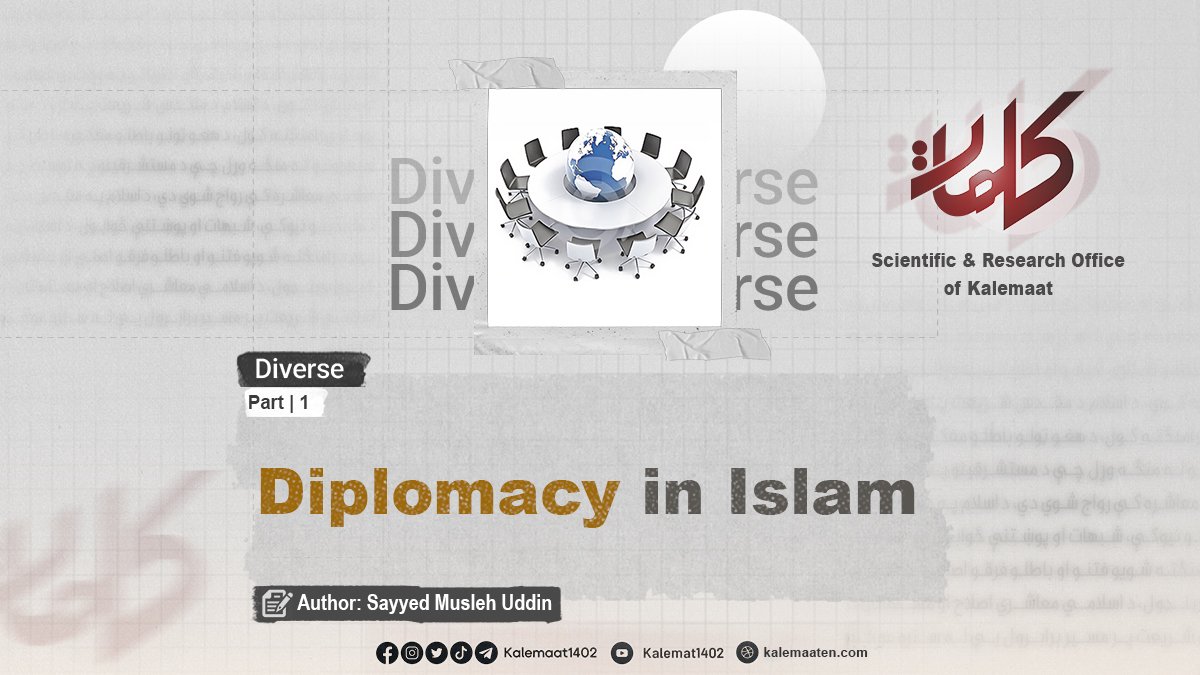
Author: Sayyed Musleh Uddin
Diplomacy in Islam (Part One)
Abstract
Politics refers to the management of public affairs, and diplomacy, as a branch of political science, investigates public affairs in the realm of international relations. Diplomacy aims to develop methods of negotiation and communication techniques that help international actors pursue their legitimate interests with minimal cost and without resorting to violence. The nature of diplomacy is grounded in skill and technique, and due to its close connection with the anarchic environment of international relations, the role of ideas, ideals, and intellectual frameworks within it is critical.
Islam, relying on the ethical foundations and rulings derived from the Qur’an and Hadith, presents models for collective human life and principles for managing public affairs through its jurisprudence (fiqh), wisdom (hikmah), ethical literature, and mysticism (irfan).
Diplomacy is a set of activities undertaken by the decision-makers of a country in their interactions with other states or international organizations in order to achieve their objectives. In essence, diplomacy is the management of relations between governments and other international actors. Another definition identifies diplomacy as the formulation and execution of foreign policy.
Introduction
Diplomacy is responsible for managing international relations through dialogue and negotiation, and it is a mistake to limit it merely to diplomatic missions or foreign policy. Diplomacy is only one of the means by which dialogue is conducted and relations between states and other international actors are regulated. Therefore, diplomacy encompasses a broader concept than the mere management of international relations, foreign policy, and diplomatic services.
Successful diplomatic practices have shown how seemingly weak states—whether materially or spiritually—can, through the use of diplomatic tools, shield themselves from significant dangers and remain protected like powerful states in the face of crises. Diplomacy also plays a role in reducing threats and thus provides an appropriate platform for projecting a powerful image of the state.
In modern political language, diplomacy is a network of relationships that links one state to another and includes systems and policies that regulate these relations. In other words, diplomacy is the foreign policy of a state, along with the motives and goals driving it.
With this in mind, we seek to explore “diplomacy” from its origins in Islam, along with some of its systems and regulations, examine its transformations and some historical events related to it, such as embassies and mutual relations between East and West, and between Islam and Christianity.
In early Islam, after the Treaty of Hudaybiyyah, the Prophet Muhammad (peace be upon him) seized the opportunity and opened negotiations with contemporary rulers, tribal chiefs, and Christian religious leaders of that time, striving to present the message of Islam to the nations of the world.
The Prophet’s written diplomatic correspondences and letters marked the beginning of Islamic diplomacy, aimed at inviting princes, kings, tribal leaders, and prominent spiritual-political figures to Islam.
The Concept of Diplomacy
The word “diplomacy” originates from the Greek term diploma, meaning a folded document or scroll that granted special privileges to individuals. In later periods, the term referred to official charters or documents given to ambassadors and state envoys.
With the expansion of foreign relations and the growing need to maintain records, the necessity for individuals to manage such affairs became apparent. These individuals were called “diplomats,” and their work became known as “diplomacy.”
The modern meanings of the terms “diplomacy” and “diplomat” date back to the late 18th century. Although there is general agreement on the meaning of diplomacy, various definitions exist, some focusing on its nature and others on its specific characteristics. Most of these definitions differ only in terminology, not in essence.
From all these definitions, it is clear that diplomacy has a peaceful nature. Negotiation and dialogue are its prominent features; the creation and preservation of peace and coexistence are its principal goals, and all of these activities take place within the realm of foreign policy.
Therefore, setting aside verbal disputes and focusing on the core objectives and essential features of diplomacy, we may define it as follows: “Diplomacy is the use of peaceful means—such as dialogue and negotiation—by states to achieve their goals.”
Consequently, a “diplomat” refers to someone who engages in these activities on behalf of a state.
In jurisprudential discussions, the term sirah (conduct or practice) is used in contrast to hadith (narration). Sirah refers to the actions and behavior of the Prophet Muhammad (peace be upon him), while hadith refers to his sayings. The combination of both is known as sunnah, which constitutes one of the sources of Islamic jurisprudence, though there are some differing opinions regarding it.
Linguistically, sirah means path, condition, manner, public presence, and travel. Thus, it inherently implies intentional movement and action (effort, diligence, and initiative). In legal contexts, sirah refers to interactions—both external (laws of war, peace, and treaties) and internal. In this sense, sirah represents a broader concept than jihad.
Here, Sirah refers to the behavioral and practical models of the Prophet Muhammad (peace be upon him) in the political domain and his external interactions with non-Muslims and foreign societies.
Continues…


